- Home
- Janet Dailey
You're Still The One Page 7
You're Still The One Read online
Page 7
“Look, Jace, I have no idea what I’m doing next, where I’m going in my life. You’re all set. You have what you wanted. And I have . . .” My fingers fumbled on my buttons. “I have a rooster that wakes me up too early, an old house, two dogs who insist on sleeping with me, cats I meow back at, and an apple orchard from my dad, who knew I loved apples, but I don’t think he meant the apples as a gift. You and I ended a long time ago, and I can’t get any more emotional or crazy than I already am.” I put my hands to my face, a vision of a run and a fall and a rock and a secret barreling into my brain. “We’re too late, Jace.”
“We’re not too late at all.” His eyes showed his deep pain and utter bafflement. “Not at all.”
And now I would lie. I’d done it before. “I don’t want to be with you, Jace. It’s that simple.”
His head actually moved back, as if I had slapped him.
“I don’t want us again, Jace. We were an us, but we’re not going to be an us again.”
“Why?” I heard that simmering anger. Jace never lost it, was never like my dad, but he wasn’t a saint. He swore and said, “I don’t understand you, or this, at all. I’m sorry if I moved too fast—I am. I’ll slow down. We’ll slow this down—”
“You don’t need to, Jace. I said no, so it’s no.”
“Then that’s it?” He put his hands out, his anger up another notch. He was huge and so unhappy. “We have everything we did before, Allie—friendship, we talk all the time, we laugh—”
It would be so easy to give in, to walk back into his arms. I burst into tears, those racking, embarrassing type of tears.
“Oh, honey,” Jace said, his anger spiking all the way back down as he tried to hug me.
I pushed him away, my hands against his warm and lovely chest. “Don’t hug me, Jace.”
“You’re making me sad watching you cry.”
“And I’m sad crying. It’s not like I want to be a sniffling mess. Where’s my room?”
“Let’s talk this out—”
“I’m not talking this out.”
“Then let’s sit in front of the fireplace—”
“No. You’ll talk me into this, I know you and I can’t resist you, and you are too much for me, and this is not right for us.” It’s not right for you, Jace, trust me on that.
He argued, I argued, I cried more, I saw tears in Jace’s dark eyes, too, then I stalked off, found a bedroom with a bed in it, and slammed the door after telling him, “Stay the hell out.”
My body was strung out, wanting Jace, my mind frazzled. I crawled under the covers and cried myself to sleep, by myself, my body rocking back and forth.
At five o’clock in the morning, I tried to sneak out the door. Through the French doors I saw Jace sitting on his deck, the sun rising like a golden ball pulled by an invisible chain from the clouds. I didn’t join him. I knew he would see me hurrying down his road to my house, but I didn’t bother to turn and wave, and he didn’t bother to call me back.
The next day I stopped by a local artist’s home studio. She lived about a mile down the road in a blue house with white trim, and had a sign out in gold lettering that said PEARL’S MOSAICS AND PAINTINGS.
When I walked in, bells chiming on the door, a woman in the other room called out, “I’ll be right with ya!”
There were paintings and mosaics, all bright, bold, flowing, and magical. One painting, about four feet tall and three feet wide, caught my eye. It was an apple tree, but tucked among the branches was a village with miniature houses and thatched roofs. Swinging wooden bridges attached one house to another. Tiny people, in traditional dress from countries all over the world, gathered under the leaves for picnics, sing-alongs, or holding hands. One boy chased a blue balloon.
The details were pure fantasy. The fall leaves on a Japanese woman’s purple kimono glowed. An Indian woman’s pink sari with gold trim floated in the wind. The plaid of three men’s Scottish kilts dropped exactly to their knees. The apple tree was a living, breathing, utopian place with stairs at the bottom of the trunk winding to a gazebo at the top, which was hung with bright white lights. A chief with a feathered headdress and moccasins played the piano.
A woman entered the studio. She had lush, thick white hair in a loose bun and a welcoming smile. Her white shirt and jeans were both covered in paint. She was beautiful. “Now, heck, you’re Ben’s daughter, Allie, aren’t you?”
“Yes, yes, I am.” I shook her hand, surprised. I shouldn’t be surprised—this home was five minutes from my dad’s, so they were neighbors—but I was. My dad did not socialize. He did not like people. He called them stupid beings posing as humans, with cardboard brains.
“I’m sorry about your dad.”
“Thank you.” I tensed up.
“Your father pushed it, by hell he did.”
I felt my mouth drop. “I’m sorry?”
“Your father, and I told him many times.” She swung a finger through the air. “He didn’t act like a father. He was a drunk pig in mud when I first met him. He was a bull with his horns down. He should have been born a slug because that’s how he was as a father, and I told him so, especially after he told me about himself in his parenting years. Inexcusable and sluggish. He was a slug.”
“Uh . . .”
“When he quit drinking the last three years, he started to talk about what a lousy father he was and he told me he didn’t think there was a worse husband on the planet.”
I felt like I’d been struck in the face with a handful of paintbrushes.
“He talked to his AA group about it, too.”
His AA group? Darned if my jaw wasn’t almost on the floor. My dad had actually admitted he was an alcoholic? He went to AA?
“I tried to get him to shape up that butt of his. I even prodded him with a pitchfork one time. Truly, I poked him in the butt, and I told him, ‘See, even when I prod your butt, Ben, you still won’t move to make amends for your cruel behavior to your daughter.’ I didn’t understand it. I’ve got six kids and fourteen grandkids and they’re over all the time, and I could not understand why he did not apologize to you and do whatever it took to make amends.”
“You knew him—”
“You bet I did, although the first two years he lived here we didn’t talk. I met him once the first year—he was a mean, slobbering, warthog drunk. He called me an old witch. We didn’t get along. But eventually I knew him backwards and forwards and inside out.” She tapped her boot. “I got him cleaned up three years ago. Told him he was an alcoholic. He argued, threw that temper tantrum of his. By golly, it didn’t scare me at all—they’re all in denial, but he had his accident, you know—”
“No, what accident?”
“Oh, that’s right. You didn’t know because he was a crappy father and out of your life. Flipped his truck late one night. He was stuck upside down like a pig hung out to slaughter. It happened right down the road in the curve where that steel goat statue stands in front of Shelby’s house. He’s a steel artist.
“Anyhow, I galloped my horse, Give Me A Shiner—that’s her name—pretty darn fast when I heard the crash, but when I saw that it was him and I smelled liquor I peered in and said to him, ‘Hello and good-bye, you pathetic drunk. You could have killed someone or knocked over a cow.’ He was trapped, hanging upside down, and I galloped away. He yelled and slurred and swore and, by God, I left him there after I told him, ‘Tonight I’m going to pray to the good Lord that wisdom will be forced into your dense head.’ ”
I scrambled to keep up with her. “You left my dad upside-down, drunk, in his truck all night?”
“Sure I did. Although I think he was able to unstrap himself later. He was still flattened out, though, stuck in that crushed truck of his.”
I almost laughed. I have a mean streak when it comes to my dad.
“You gotta let drunks hit the very bottom rung of their lives, or they’re not getting better. By the time I rode back out about eight hours later, after my morning coffee, h
e’d made a mess all over himself in each direction. Lucky it was summer so he didn’t freeze, but he was still cold. Hungover and screwed up—that gave him a God moment, I think. Can you get much lower?”
“That’s pretty low.” I stood and marveled. I was totally amused at the thought of Dad upside-down. That’s what a drunken parent who calls you apple-core face does to you. They warp your sense of humor.
“I peered into the window and said, ‘You ready to change now, you donkey’s ass?’ He was crying. Broken. Like a bird with all the bones shattered here and there, the feathers of his wings all falling off. I hate to see a man crumble down to nothing, but he had to have that sweet meltdown. He nodded his head and vomited, so I called the police and a tow truck. They came. Ambulance took him to the hospital. I wasn’t going to take him smelling to the high heavens like that. He had to stay there for three nights.”
“What were his injuries?”
“Oh, a bunch of ’em. Self-deserved, by golly. Broken leg, broken arm, concussion. Dehydration. He’d tossed his cookies. Bruises. Bumps on his noggin. Truck was totaled. He remembered seeing me the night before, but I told him he wasn’t ready to join the civilized world because he was a menace to the rest of us on the road, so I’d left him.”
“What did he say?”
“He told me later that he was grateful every day he didn’t hurt anyone else and he deserved to be left there.”
I had to take a moment to process that one. My dad never took responsibility and was never concerned about anyone else. Never.
Pearl pointed her finger. “That man was so destroyed from what he thought was going to be his certain death, he didn’t even get mad at me. He had trouble breathing in there, he told me later. He’d had two heart attacks in his life and he thought the big one was coming and he was going to die upside down in his truck—”
“Two?” I knew about the one. “How . . .” I choked back a wall of emotion that unexpectedly sprung up in my throat. “How was he after that?”
“Didn’t touch a drop.”
“He stopped drinking? On his own?”
“Nah. That would have been impossible—he was too much of a lush, total crackpot. A bunch of the neighbors had one of those interventions. We went over to his house and told him he was the worst son of a you-know-what when he was drinkin’. We told him he was goin’ to rehabilitation. He refused, said he could do it on his own, so Tally raised his gun and shot a hole through the floor.”
I hooted. “I saw that bullet hole, and there’s another one in the wall.”
“The one in the wall is from Larry Dave. He said, ‘Donkey’s butt, you’re going to rehab because if you don’t, I’m going to burn your house down so you’ll move. We can’t have hammered drunks driving here—there’s kids on bikes who could get hurt, and you have tried our patience to the limit.’ Your dad gave some more push-back, his face all bruised and busted, bandages everywhere, and Larry Dave shot the gun again. That was about it. Your dad almost pissed himself.
“We shoved him in Bryan B’s truck—he’s got his guns on a rack there. You know Bryan B yet? He owns a high-tech business. Anyhow, he and William took him in. William’s an ears, nose, and throat specialist and his brother is a doctor in one of the rehab places, so we were able to smooth things along.”
“How long was he there?”
“Six months—can you believe it? He was a bad case. He didn’t have any of the animals then, so we checked on the house, made sure the pipes didn’t freeze and bust.”
Six months in rehab would have cost a fortune. I thought of my ball-breaking Grandpa Tad. He’d owned a chain of liquor stores and had made a bundle, although he lived like a pauper. That was where the rest of my dad’s inheritance went. Rehab and the house and orchard.
“They cleaned him up and started him thinking like a normal man, they did,” Pearl said.
I tried to squish down my roaring anger with my dad. Finally, finally, at the end of his life he gets sober? What about me? What about my mother? Why couldn’t he have gotten sober for us? His lack of sobriety cost my mother her life. “How was he after rehab?”
“New man, sweetie. New man. Humbled down to nothing. Went to AA every day. Kind, gentle, started talking a lot about you and your mom.” Pearl’s eyes got watery. “He knew he’d blown it. It was one of the reasons he’d kept drinking. Said he’d been a terrible husband. He blamed himself for your mom’s death. Said if he hadn’t been a jerk, she wouldn’t have left, wouldn’t have been killed in the avalanche. Hadn’t talked to you in years and said he missed you like the dickens, but said he didn’t do a good job.”
“He didn’t do a good job? He did a horrendous job. I moved out when I was sixteen because I couldn’t stand him. Couldn’t take being called useless, dumb, weird eyes like a cat, sneaky, loose . . .” I could hardly say the words, and I had no idea why I was sharing them with her. Maybe it was Pearl’s kind eyes; maybe it was because she had known my dad but had a clear view of his vile personality.
I deliberately tamped down my rising temper. Why did I let the memory of him still yank my emotions around? Why did I let him have that control over me? “Were you friends with him then?”
“We were more than friends, sugar. After about a year of him being sober, we became a couple. He had a lot of edges that I had to smooth down with a sandblaster and a pickax. I let him have it a number of times, and sometimes I wouldn’t even speak to him and he wasn’t allowed to cross my doorway. See, I think the alcohol stunted his emotional growth and maturity, and I had to play catch-up with him, beat him into human form and release the caveman within.”
“How’d he do?”
“By the end he was a good man, Allie. He even adopted the animals, all of them strays or rescues, to keep him company, and he spoiled all of them. He trained as a carpenter and actually did good work. See all my shelving? He did that for me.”
I choked down a sob and put my hands to my face.
“I’m sorry, honey. I know that’s gotta hurt to the core. He was good for me but not good for you and your momma, who deserved it. I get it. Man, that chicken-crap man! It makes me burn to think about it. You and your poor mother. That scarecrow creep. I’m telling you, I told him to call you and he said he did, but you didn’t call back, and I said to him, ‘What did you expect?’ He knew—he knew, Allie—that he didn’t deserve you. He cried over it.”
“You must be joking.”
“Not at all. Bawled like a baby. Many times. He had your photos in his wallet, along with your momma’s, and I saw him staring at them time and time again.”
The tears welled out of my eyes. I was touched by what she said about my dad, but I was red-hot mad. He found love for us at the end of his life?
“This painting—” I changed the subject. I’d had enough. I was going to explode. “I’d like to buy it.”
“Let me wrap it up for you, honey.”
“You’re a talented artist, Pearl.”
“Thank you.” She paused. “Perhaps . . . perhaps we could have lunch one day? You could come over here. I’ll kill one of the chickens and we’ll have avocado pesto chicken sandwiches and lemonade.”
I blinked, surprised. I had lived in the city a long time. I wasn’t used to such outward friendliness or having someone offer to twist a chicken’s neck for me. “Yes, yes, I would like that. Thank you.” Looking into her kind eyes, I realized that I would.
“We can talk about your dad if you want. Or we can leave the ole saddle-buster out of the whole thing.”
“I . . . I don’t know what I want. I don’t know if I want to hear about it . . . I think I do, maybe not . . .”
She put her hands on my shoulders. “Don’t make a decision now, sweetie. We’ll start as girlfriends.”
“Thank you.” I gave her my debit card to pay for the apple-tree painting with the amazing details.
“I refuse,” Pearl said. “It’s my gift to you, Allie. I know that your dad would want you to have it, too. I’m
sorry about your daddy, sweetheart.” She gave me a hug. “He was sorry, too.” She gave me another hug. “You know there’s a barn dance coming up, right, sugar?”
I found a hammer and nails in the garage and I hung up Pearl’s painting over the fireplace. It added life, color, fantasy, and imagination.
I sat down on the couch with my mother’s red-and-white flowered quilt, took a peek at my dad holding open the bedroom door in his urn, and wrapped my arms tight around myself.
He had become a good man too late.
Way too late.
I read Jane Austen that night, lying under my yellow bedspread, then a crime thriller, and back to Jane. My strawberry-scented candle flickered on the nightstand. I couldn’t sleep and ended up pacing through the orchard, Bob and Margaret running around me in circles. I studied the constellations. I found no peace in them.
Chapter Nine
I recognized him immediately.
Jace was clad in a bike helmet and dark glasses hunched over his racing bike, making the bike look small. We were about to pass each other in the middle of a quiet, winding road, a vineyard to one side, a farm on the other, the morning sun warm, a bunch of birds peeping.
I kept biking. Maybe he wouldn’t recognize me. I was pedaling slowly because my ankle and leg were still tender, but I crossed to the other side of the street and turned my head away to hide my face. I, too, had on a helmet and dark glasses.
We passed. I exhaled with deep relief, before the choking sadness that has chased me around since I lost Jace years ago came roaring back, like grief on wheels. I put my head down and pedaled as hard as I could without splitting my leg open, as I’d always done to outride what I didn’t want to think about.
“Good to see you on your bike, Allie.”
I turned my head. He was right next to me, smiling. Handsome. Overpoweringly manly and muscled and huge.
“I can’t believe this,” I muttered.
“Where are you riding to?”
“I think I’m riding away from you. You go that way, I’ll go this way.” I tugged on the strap of my helmet as we pedaled beside each other.

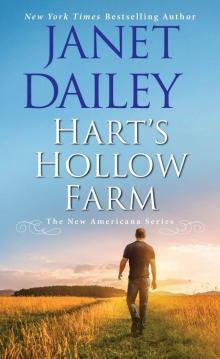 Hart's Hollow Farm
Hart's Hollow Farm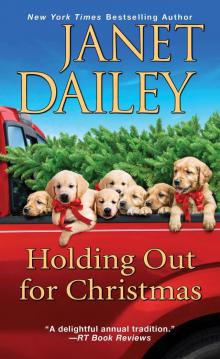 Holding Out for Christmas
Holding Out for Christmas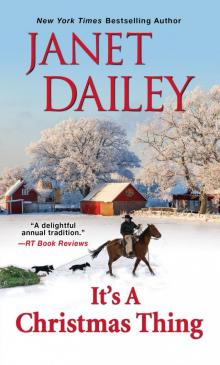 It's a Christmas Thing
It's a Christmas Thing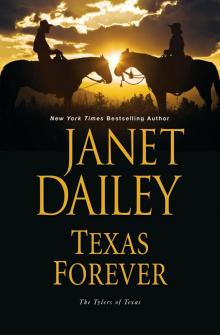 Texas Forever
Texas Forever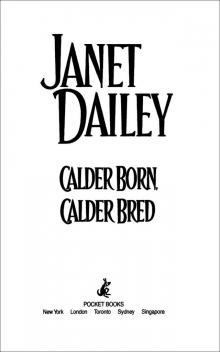 Calder Born, Calder Bred
Calder Born, Calder Bred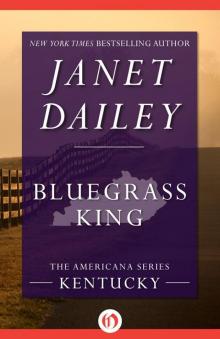 Bluegrass King (The Americana Series Book 17)
Bluegrass King (The Americana Series Book 17)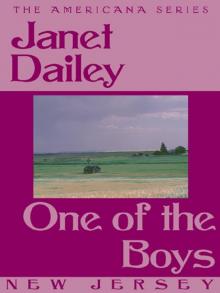 One of the Boys
One of the Boys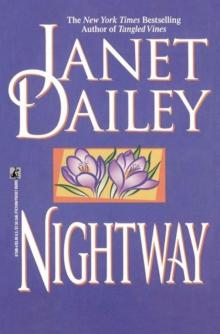 Nightway
Nightway This Calder Sky
This Calder Sky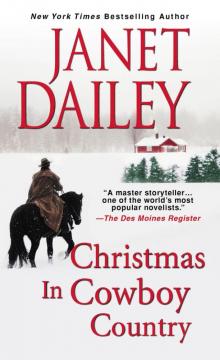 Christmas in Cowboy Country
Christmas in Cowboy Country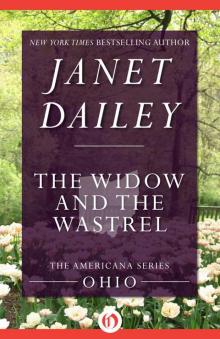 The Widow and the Wastrel
The Widow and the Wastrel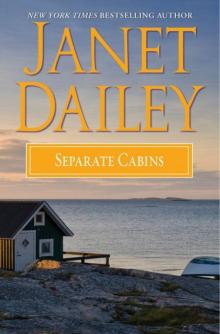 Separate Cabins
Separate Cabins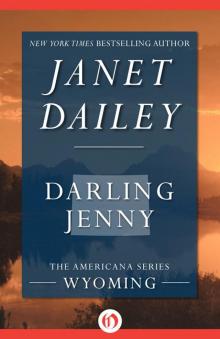 Darling Jenny
Darling Jenny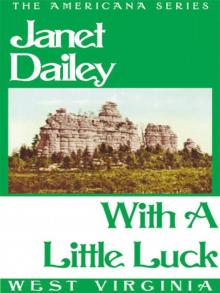 With a Little Luck
With a Little Luck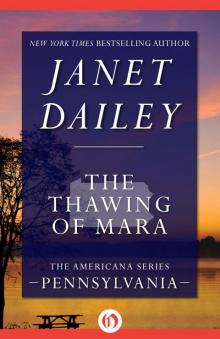 The Thawing of Mara
The Thawing of Mara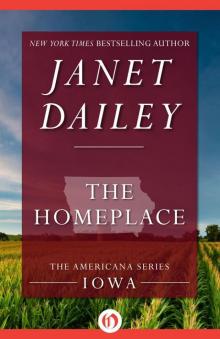 The Homeplace (The Americana Series Book 15)
The Homeplace (The Americana Series Book 15)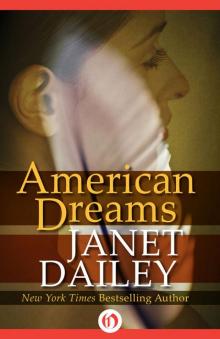 American Dreams
American Dreams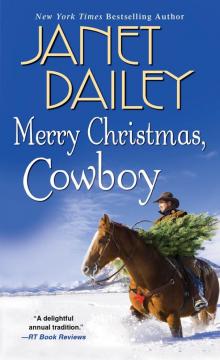 Merry Christmas, Cowboy
Merry Christmas, Cowboy Lord of the High Lonesome
Lord of the High Lonesome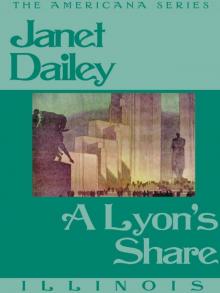 A Lyon's Share
A Lyon's Share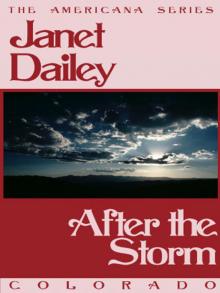 After the Storm
After the Storm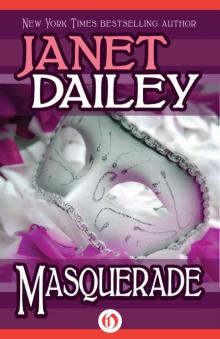 Masquerade
Masquerade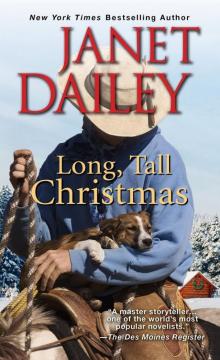 Long, Tall Christmas
Long, Tall Christmas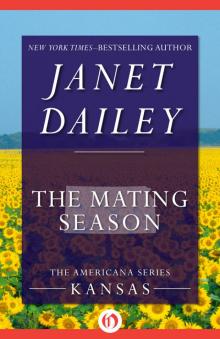 The Mating Season
The Mating Season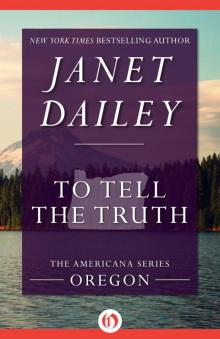 To Tell the Truth
To Tell the Truth A Land Called Deseret
A Land Called Deseret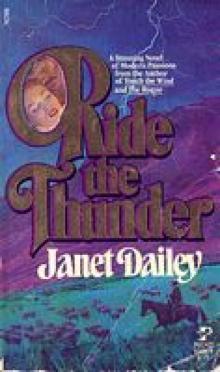 Ride the Thunder
Ride the Thunder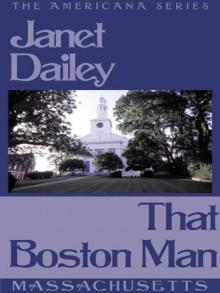 That Boston Man
That Boston Man Wild and Wonderful
Wild and Wonderful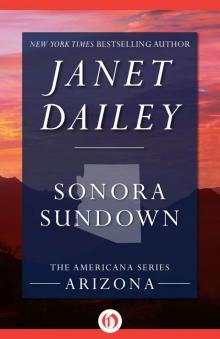 Sonora Sundown: Arizona (The Americana Series Book 3)
Sonora Sundown: Arizona (The Americana Series Book 3)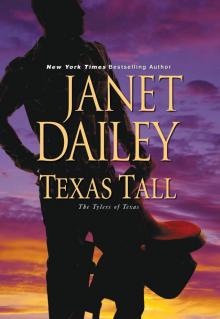 Texas Tall
Texas Tall Giant of Mesabi
Giant of Mesabi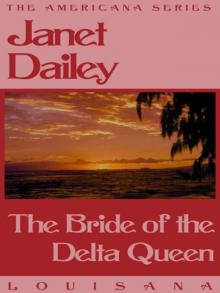 The Bride of the Delta Queen
The Bride of the Delta Queen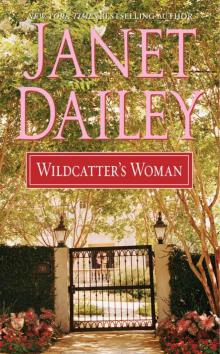 Wildcatter's Woman
Wildcatter's Woman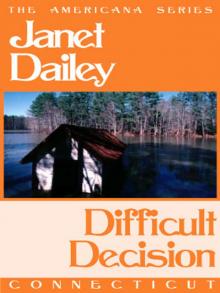 Difficult Decision
Difficult Decision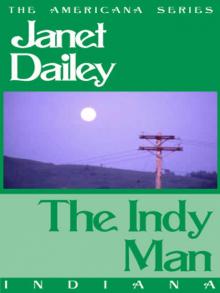 The Indy Man
The Indy Man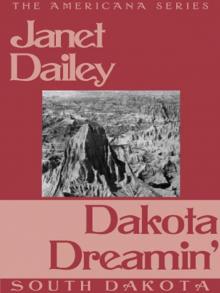 Dakota Dreamin'
Dakota Dreamin' Kona Winds
Kona Winds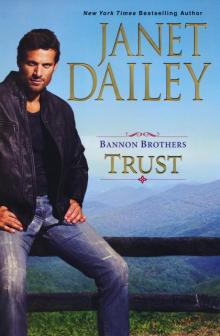 Bannon Brothers
Bannon Brothers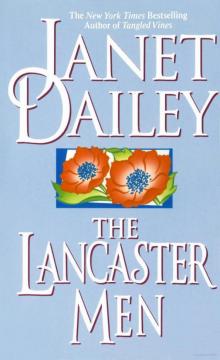 The Lancaster Men
The Lancaster Men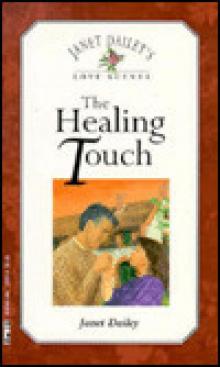 janet dailey- the healing touch
janet dailey- the healing touch Strange Bedfellow
Strange Bedfellow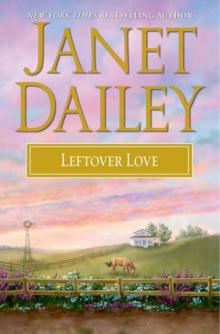 Leftover Love
Leftover Love Big Sky Country
Big Sky Country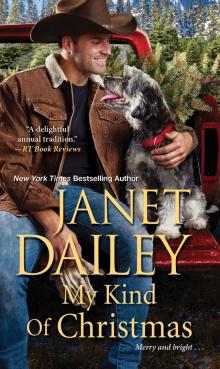 My Kind of Christmas
My Kind of Christmas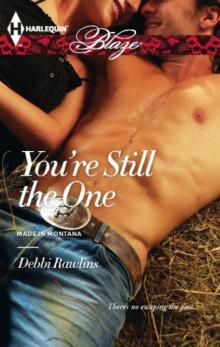 You're Still The One
You're Still The One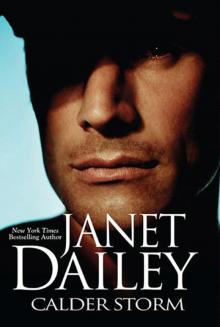 Calder Storm
Calder Storm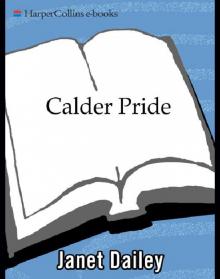 Calder Pride
Calder Pride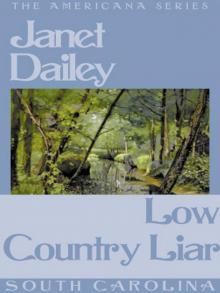 Low Country Liar
Low Country Liar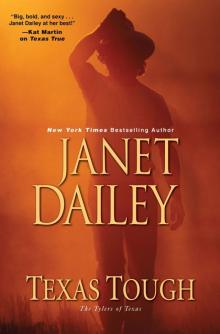 Texas Tough
Texas Tough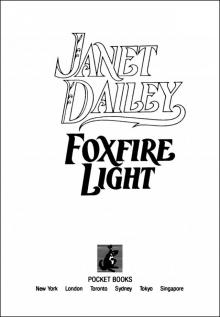 Foxfire Light
Foxfire Light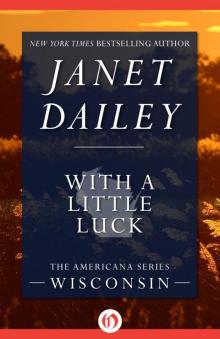 With a Little Luck (The Americana Series Book 49)
With a Little Luck (The Americana Series Book 49)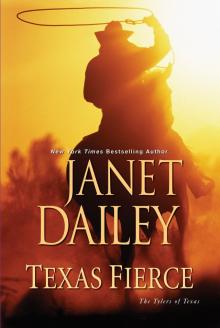 Texas Fierce
Texas Fierce Sentimental Journey
Sentimental Journey The Pride of Hannah Wade
The Pride of Hannah Wade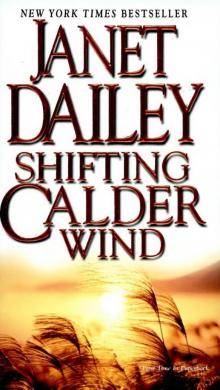 Shifting Calder Wind
Shifting Calder Wind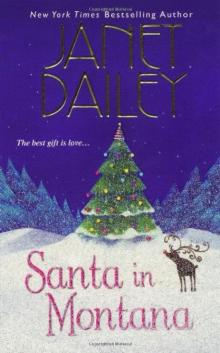 Santa In Montana
Santa In Montana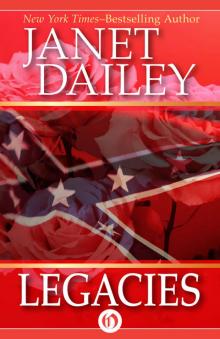 Legacies
Legacies Land of Enchantment
Land of Enchantment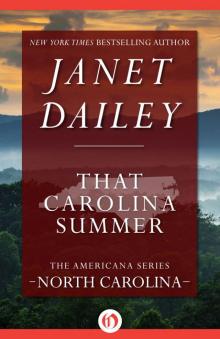 That Carolina Summer (North Carolina)
That Carolina Summer (North Carolina)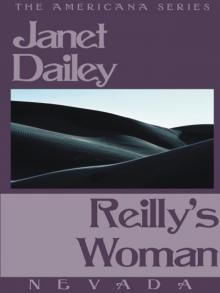 Reilly's Woman
Reilly's Woman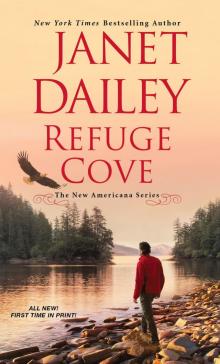 Refuge Cove
Refuge Cove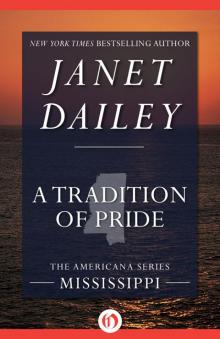 A Tradition of Pride
A Tradition of Pride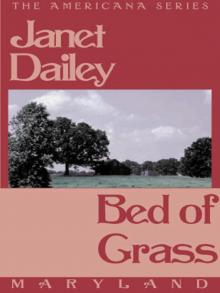 Bed of Grass
Bed of Grass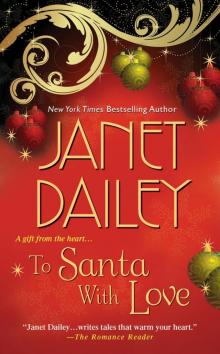 To Santa With Love
To Santa With Love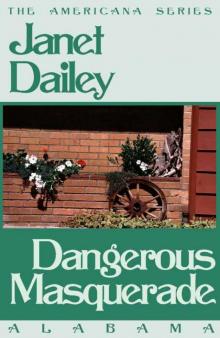 Dangerous Masquerade
Dangerous Masquerade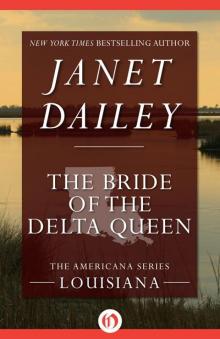 The Bride of the Delta Queen (The Americana Series Book 18)
The Bride of the Delta Queen (The Americana Series Book 18)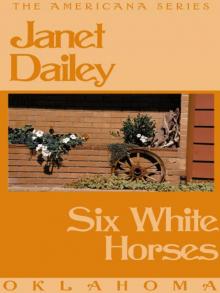 Six White Horses
Six White Horses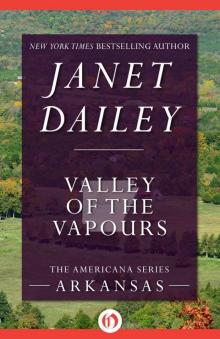 Valley of the Vapours (The Americana Series Book 4)
Valley of the Vapours (The Americana Series Book 4)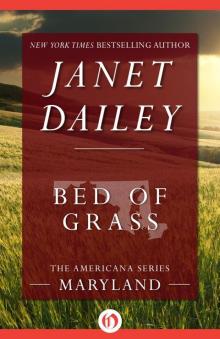 Bed of Grass (The Americana Series Book 20)
Bed of Grass (The Americana Series Book 20)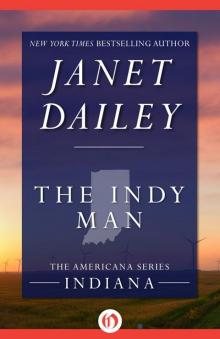 The Indy Man (The Americana Series Book 14)
The Indy Man (The Americana Series Book 14)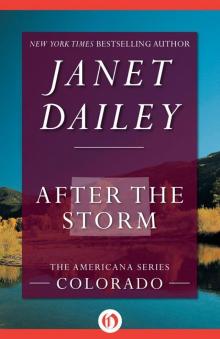 After the Storm (The Americana Series Book 6)
After the Storm (The Americana Series Book 6)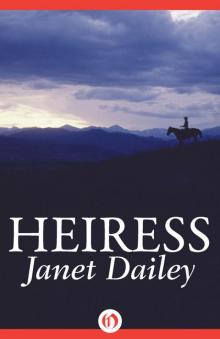 Heiress
Heiress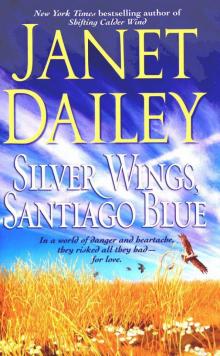 Silver Wings, Santiago Blue
Silver Wings, Santiago Blue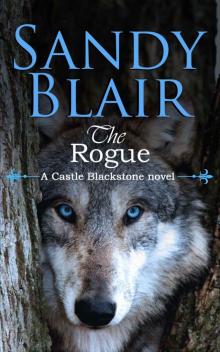 The Rogue
The Rogue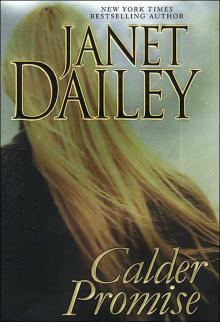 Calder Promise
Calder Promise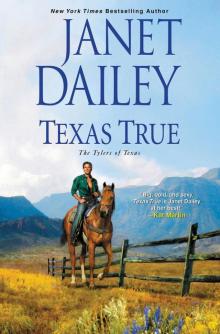 Texas True
Texas True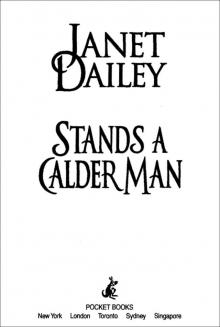 Stands a Calder Man
Stands a Calder Man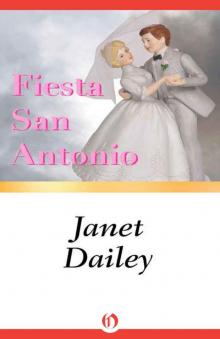 Fiesta San Antonio
Fiesta San Antonio Fire and Ice
Fire and Ice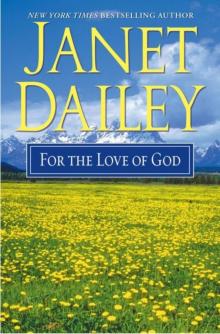 For the Love of God
For the Love of God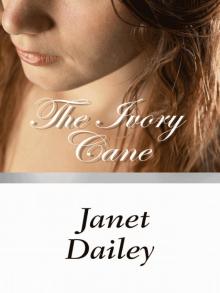 The Ivory Cane
The Ivory Cane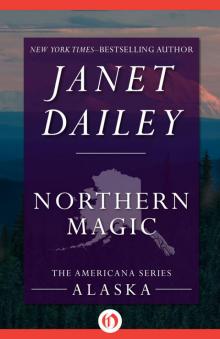 Northern Magic
Northern Magic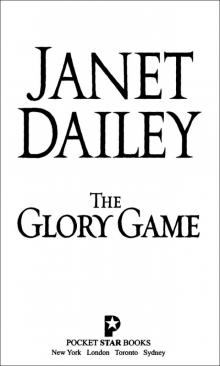 The Glory Game
The Glory Game The Homeplace
The Homeplace The Great Alone
The Great Alone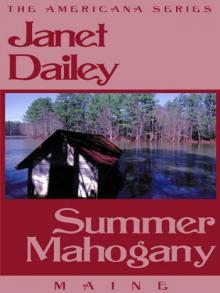 Summer Mahogany
Summer Mahogany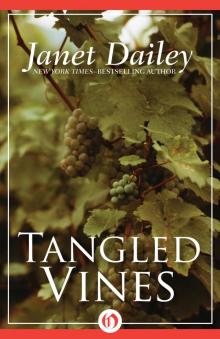 Tangled Vines
Tangled Vines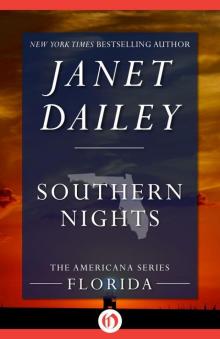 Southern Nights: Florida (The Americana Series Book 9)
Southern Nights: Florida (The Americana Series Book 9)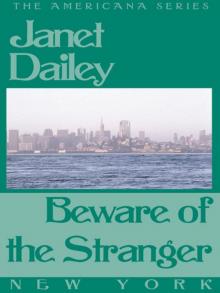 Beware of the Stranger
Beware of the Stranger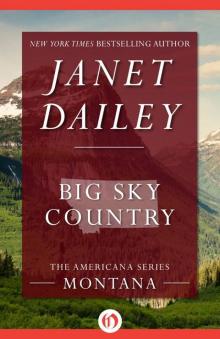 Big Sky Country: Montana (The Americana Series Book 26)
Big Sky Country: Montana (The Americana Series Book 26)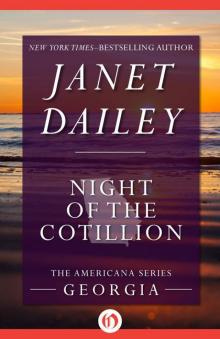 Night of the Cotillion: Georgia (The Americana Series Book 10)
Night of the Cotillion: Georgia (The Americana Series Book 10)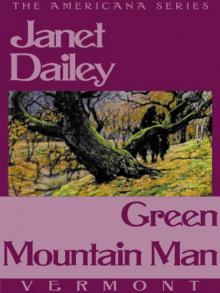 Green Mountain Man
Green Mountain Man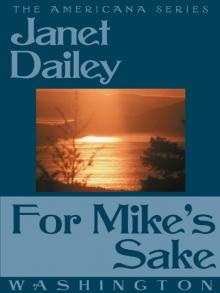 For Mike's Sake
For Mike's Sake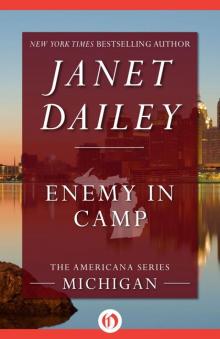 Enemy in Camp (The Americana Series Book 22)
Enemy in Camp (The Americana Series Book 22)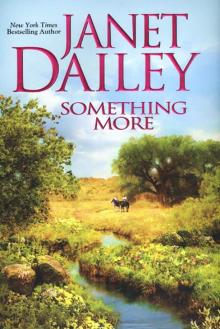 Something More
Something More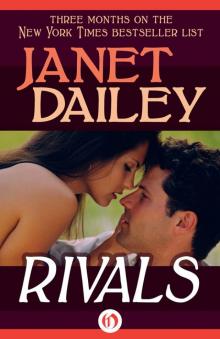 Rivals
Rivals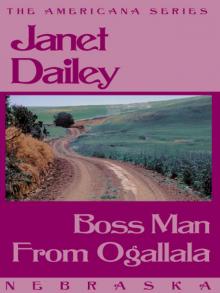 Boss Man from Ogallala
Boss Man from Ogallala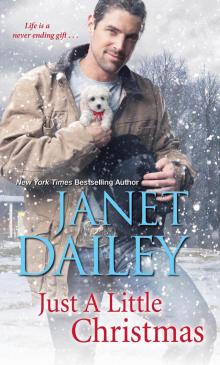 Just a Little Christmas
Just a Little Christmas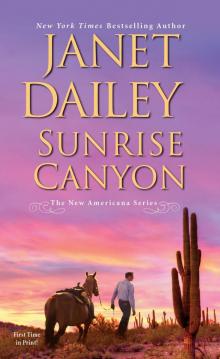 Sunrise Canyon
Sunrise Canyon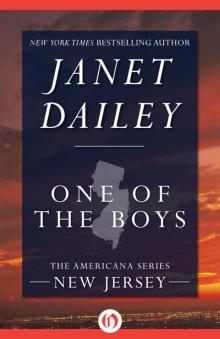 One of the Boys (New Jersey)
One of the Boys (New Jersey)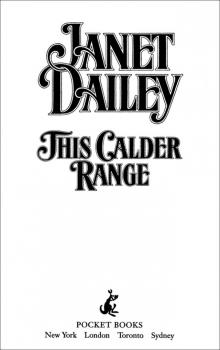 This Calder Range
This Calder Range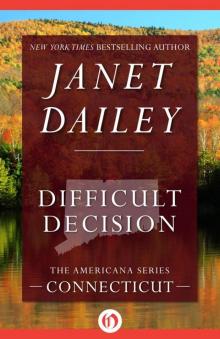 Difficult Decision: Connecticut (The Americana Series Book 7)
Difficult Decision: Connecticut (The Americana Series Book 7)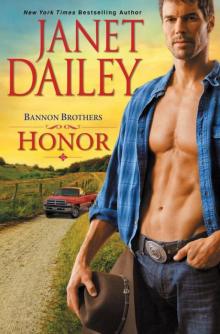 Honor
Honor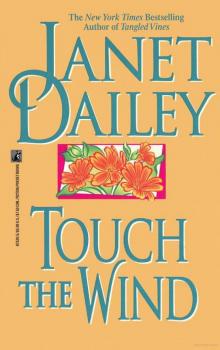 Touch the Wind
Touch the Wind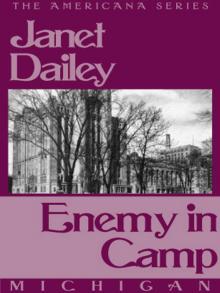 Enemy in Camp
Enemy in Camp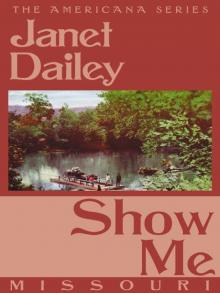 Show Me
Show Me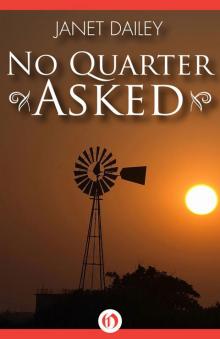 No Quarter Asked
No Quarter Asked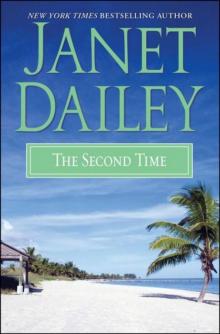 The Second Time
The Second Time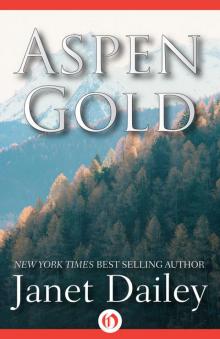 Aspen Gold
Aspen Gold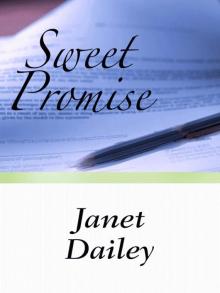 Sweet Promise
Sweet Promise Triumph
Triumph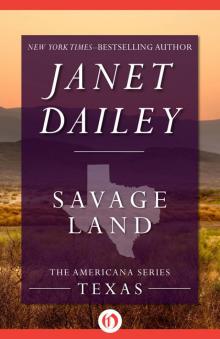 Savage Land
Savage Land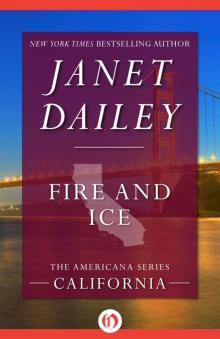 Fire and Ice (The Americana Series Book 5)
Fire and Ice (The Americana Series Book 5)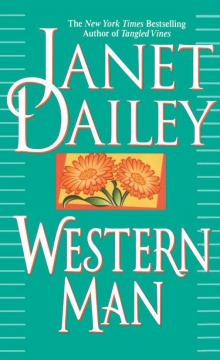 Western Man
Western Man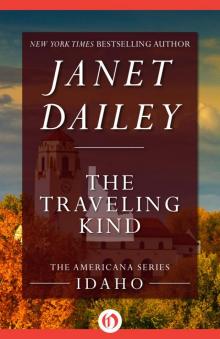 The Traveling Kind
The Traveling Kind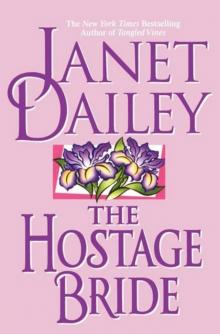 The Hostage Bride
The Hostage Bride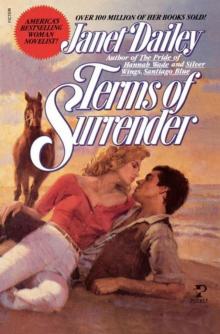 Terms of Surrender
Terms of Surrender Tidewater Lover
Tidewater Lover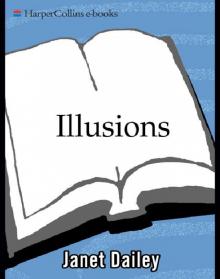 Illusions
Illusions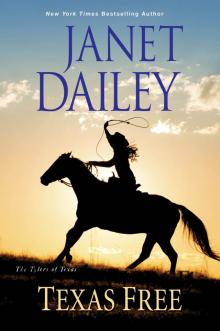 Texas Free
Texas Free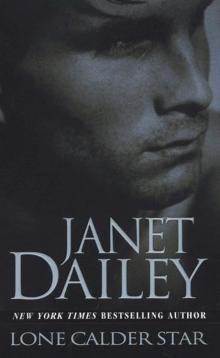 Lone Calder Star (Calder Saga Book 9)
Lone Calder Star (Calder Saga Book 9)